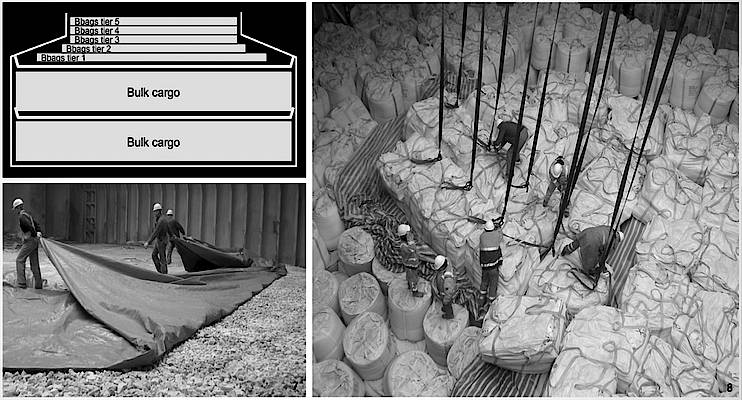Separating cargoes
The combination of agri-products and minerals onboard a vessel, which are always stowed in different holds, may vary considerably – in a typical Handymax with five holds, all of them may be loaded with minerals, or sometimes only one having minerals with four agri-product holds. Inversely, vessels that have predominantly been loaded with minerals might only require one additional hold of agri-products. A single mineral hold may contain several different types of mineral cargoes from several different Chinese ports and may be all bulk, all big bags or a combination of the two.
One of the important aspects of parcel shipment is the efficient separation of different mineral cargoes within the same hold. This may include various combinations of different bulk materials with big bags.

For example, a common method of mixing cargoes is to have the bulk products in the base of the hold. This is then covered by a large tarpaulin, which covers the centre of the hold and four smaller stripes of tarpaulin, which cover the sides. Both tarpaulins overlap by at least two metres in order to allow for additional protection. It is also easier to glue the stripes to the side of the hold.
Big bags can already start to be loaded in the centre of the hold while workmen are busy preparing the sides. The bags themselves are protected from the steel walls of the hold by a wooden layer called dunnage. Steel plates are usually also placed on the tarpaulin to protect it from the caterpillars and excavators that are used to assist with loading and unloading. There may be as many as five tiers of big bag layers on top of the bulk material.

> 5 holds of minerals "Heavy"

> 3 holds of minerals "Heavy"
> 2 holds of agri-products "Light"

> 1 hold of minerals "Heavy"
> 4 holds of agri-products "Light"
Conclusion
- Cargo Parcel Service takes advantage of combining smaller parcels of heavy and light cargoes, bulk and break-bulk
- Cargo Parcel Service offers higher frequency at reduced cost
- Cargo Parcel Service focus on cheaper larger versus more expensive smaller vessels





